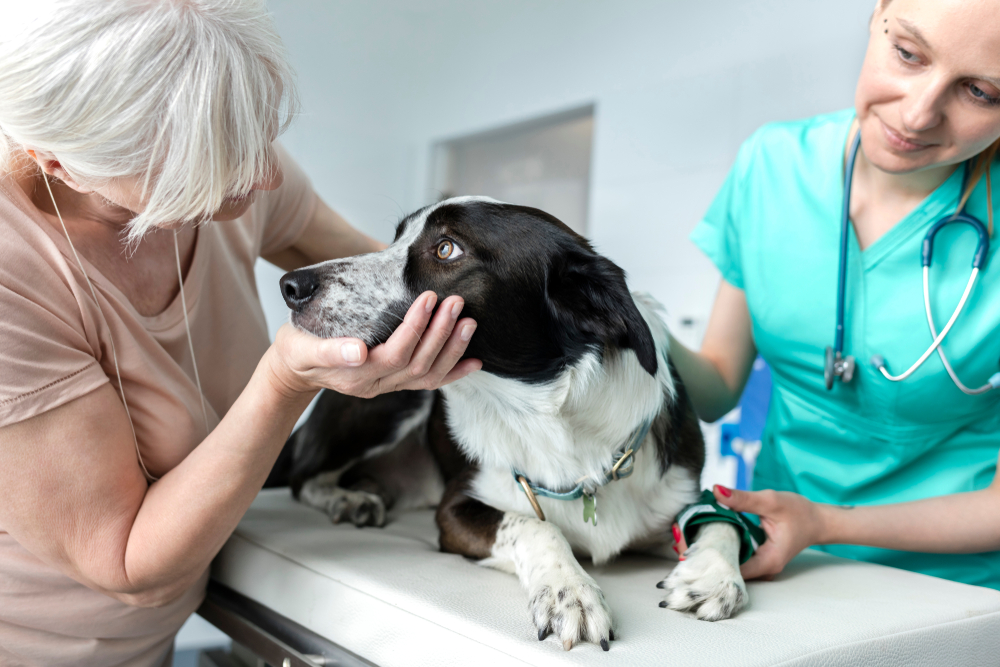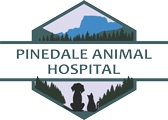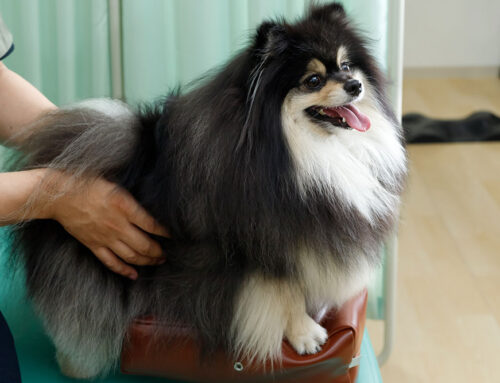They’ve been by your side through it all—tail wags after long days, comfort during hard times, and joy in the smallest of moments. Your dog isn’t just a pet—they’re your best friend, your shadow, your constant. As they start to slow down and show signs of aging, it’s our turn to be there for them with the same loyalty and love they’ve given us all along.
At Pinedale Animal Hospital in Pinedale, Wyoming, we understand how meaningful this chapter can be. Aging brings new needs, from joint support to gentle wellness care, and we’re here to walk with you every step of the way. This guide covers common age-related health concerns, early signs to watch for, and ways to keep your dog comfortable, active, and happy in their golden years.
Schedule a Senior Pet Check-Up Today
Osteoarthritis and Joint Pain in Aging Dogs
What Is Osteoarthritis?
Osteoarthritis is a degenerative joint disease that results from the breakdown of cartilage, causing pain, inflammation, and reduced mobility. It’s especially common in large breeds, overweight dogs, and senior pets.
Signs to Watch For:
- Limping or favoring one leg
- Stiffness after sleep or inactivity
- Difficulty climbing stairs or jumping
- Decreased interest in play or walks
Management Options:
- Weight control to minimize joint strain
- Joint supplements like glucosamine, chondroitin, and omega-3s
- Low-impact exercise such as swimming or short, gentle walks
- Pain relief through NSAIDs, laser therapy, or acupuncture
Explore safe exercises for arthritic dogs – Zoetis
Cognitive Dysfunction Syndrome (CDS)
Understanding Canine Cognitive Decline
Cognitive Dysfunction Syndrome is similar to dementia in humans and affects memory, behavior, and awareness in aging dogs.
Symptoms Include:
- Getting lost in familiar spaces
- Changes in sleep-wake cycles
- Loss of house training
- Anxiety, restlessness, or increased vocalization
- Disinterest in people or routines
Supportive Care:
- Mental enrichment: Puzzle toys, scent games, and training
- Dietary support: Antioxidant-rich foods and omega-3s
- Structured environment: Keep routines consistent
- Medications: Selegiline (Anipryl) may help slow progression
Learn more about CDS – Cornell University
Hypothyroidism in Senior Dogs
What It Is:
Hypothyroidism occurs when the thyroid gland produces insufficient hormones, leading to slowed metabolism and systemic changes.
Common Symptoms:
- Lethargy and fatigue
- Weight gain without increased food intake
- Hair thinning, dry skin, or cold intolerance
- Skin infections or chronic ear problems
Treatment:
- Daily thyroid medication (levothyroxine)
- Routine bloodwork to monitor hormone levels
- Balanced nutrition and exercise to maintain weight
More about hypothyroidism – Cornell Vet
Diabetes in Older Dogs
Understanding Canine Diabetes
Diabetes mellitus affects the body’s ability to regulate blood glucose. It is more common in overweight dogs and certain breeds.
Warning Signs:
- Increased thirst and urination
- Weight loss despite increased appetite
- Recurrent infections
- Cloudy eyes (cataracts)
Management:
- Insulin therapy: Typically administered twice daily
- Consistent, balanced meals: High in fiber and low in simple carbs
- Blood glucose monitoring
- Routine vet visits for treatment adjustments
Learn more – AAHA Diabetes Guide
Cancer in Senior Dogs
Common Cancers in Older Dogs:
- Lymphoma: Affects the lymphatic system
- Mast Cell Tumors: Skin tumors, variable in severity
- Hemangiosarcoma: Aggressive tumors often in the spleen or heart
- Osteosarcoma: Bone cancer, especially in large breeds
Signs to Look For:
- Persistent swelling or lumps
- Sudden weight loss
- Lethargy or exercise intolerance
- Difficulty breathing or limping
Treatment Options:
- Surgery, chemotherapy, or radiation
- Palliative care to manage pain and maintain comfort
- Early detection through regular screening is key
Explore common pet cancers – AAHA
Preventive Care Strategies for Senior Dogs
Regular Wellness Exams
As your dog ages, routine vet visits do more than monitor health—they help you stay ahead of changes that can impact your pet’s comfort and quality of life. These check-ins are a chance to catch subtle shifts before they become serious problems and adjust care as needed.
At Pinedale Animal Hospital, we recommend:
- Biannual wellness exams to keep a close eye on evolving needs
- Blood and urine screenings to catch organ changes early
- Heart, lung, and joint assessments to monitor aging systems
Preventive testing for seniors – Zoetis Petcare

Nutrition and Supplements
A healthy diet makes a big difference in how your senior dog feels day to day. As metabolism slows and certain conditions emerge, targeted nutrition becomes essential.
- Senior dog formulas support digestion, immunity, and joint health
- Weight control is key to reducing strain on aging joints and organs
- Joint supplements and omega-3s can help ease arthritis and stiffness
- Antioxidants like vitamin E may help delay cognitive decline
Read more – Purina’s Guide to Senior Dog Supplements
Keeping Them Moving—Body and Brain
Movement is medicine for aging dogs. While their pace may be slower and their play sessions shorter, physical and mental activity remains essential for maintaining strength, flexibility, and overall happiness.
Even if your dog has arthritis or mobility challenges, there are gentle ways to keep them engaged:
- Short, consistent walks help keep joints limber and minds sharp
- Strolling around the block or the yard allows them to sniff, explore, and stay mentally stimulated
- If walking is too hard, try a pet wagon or stroller so they can still enjoy the sights and smells of the outside world
- Puzzle toys, scent games, and simple training exercises help keep their brains active and spirits high
- Swimming (if accessible and safe) is a great low-impact option for dogs with joint pain
You know your dog better than anyone—watch for what brings them joy and adapt activities to their comfort level. At this stage, it’s less about how far they go and more about helping them stay connected to the world around them.
Give Your Dog the Comfortable Retirement They Deserve
Your dog’s golden years can still be full of love, comfort, and joy. With regular veterinary care, early disease detection, and a supportive home environment, you can make these years some of the best yet.
If your dog is showing signs of aging or you’d like to set up a wellness plan tailored to their needs, we’re here to help.







Leave A Comment